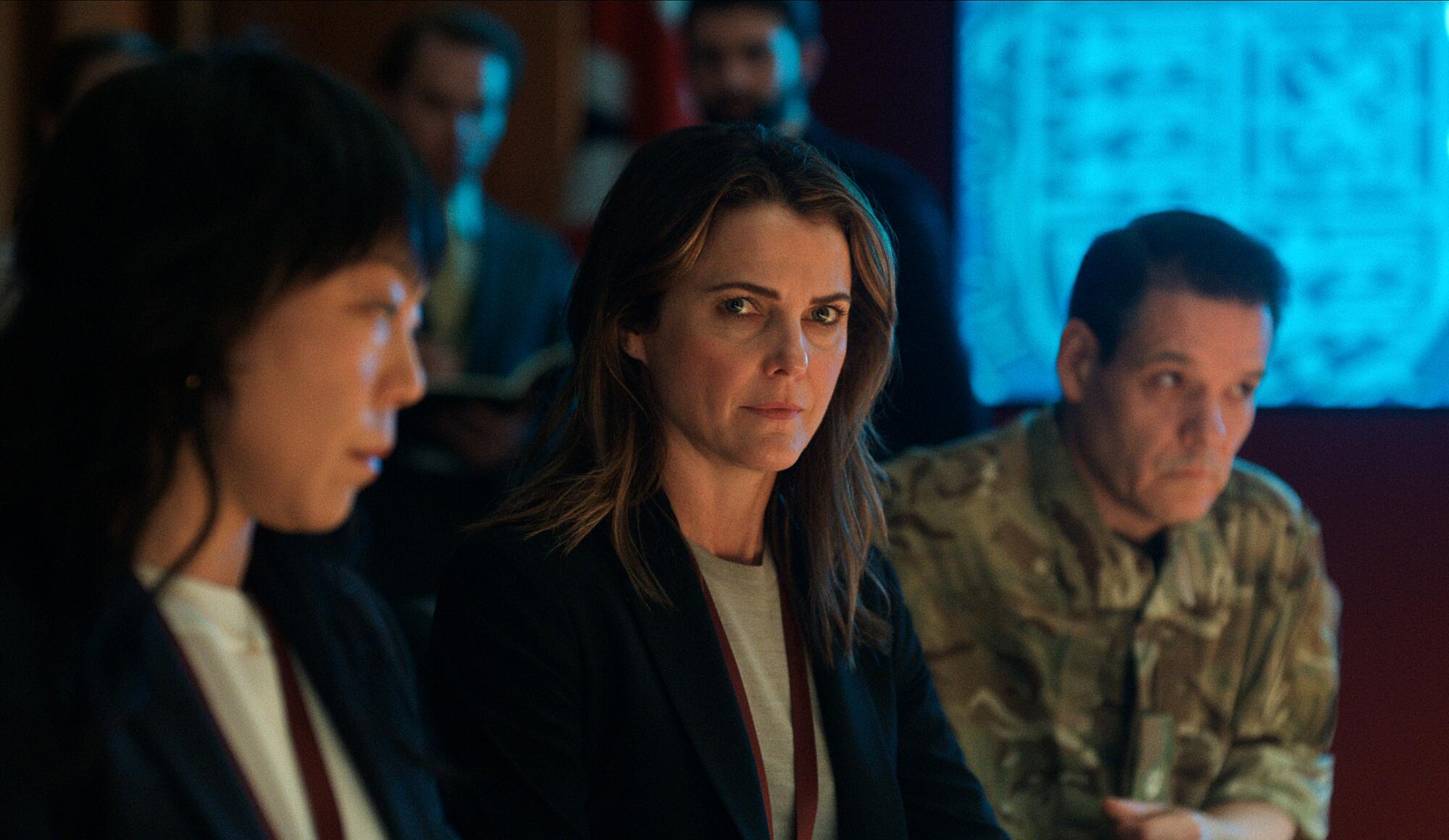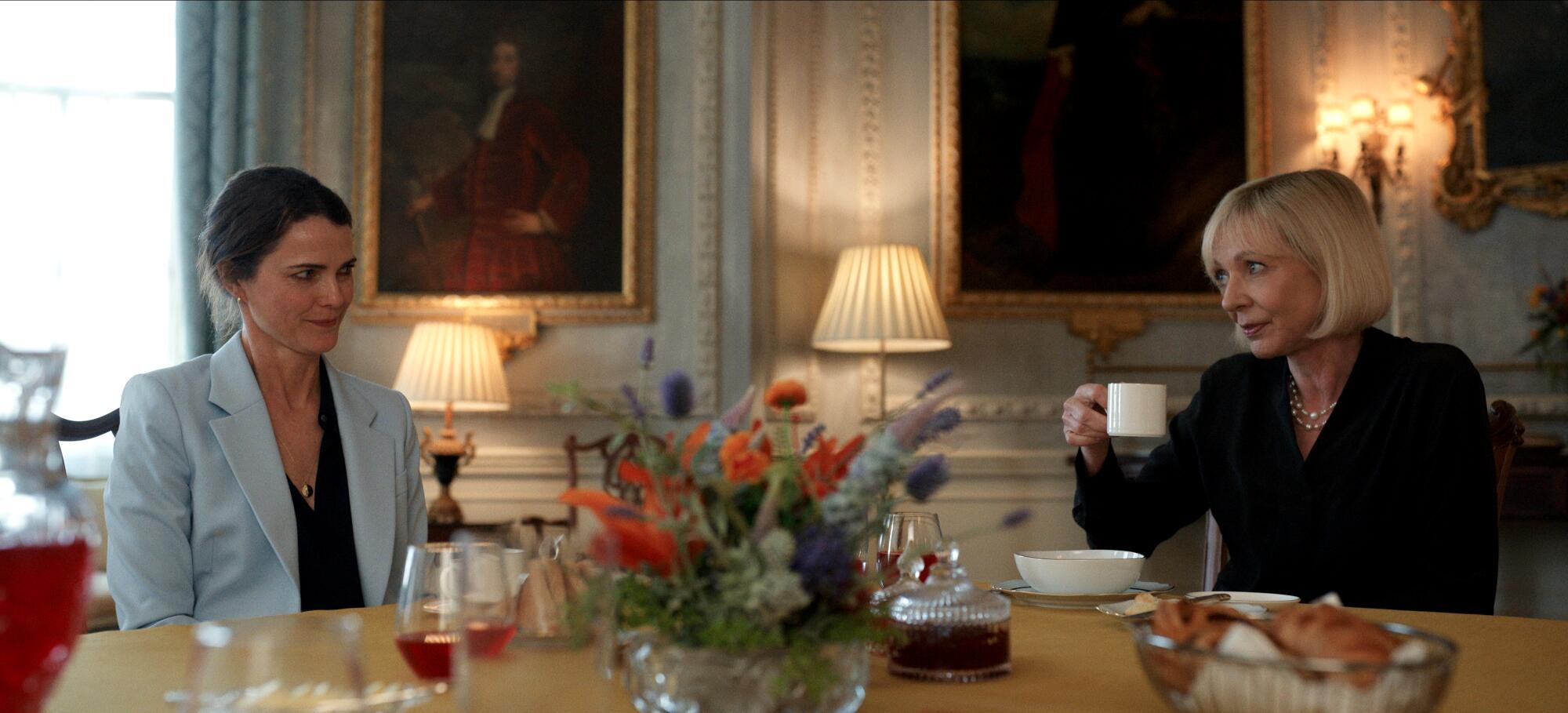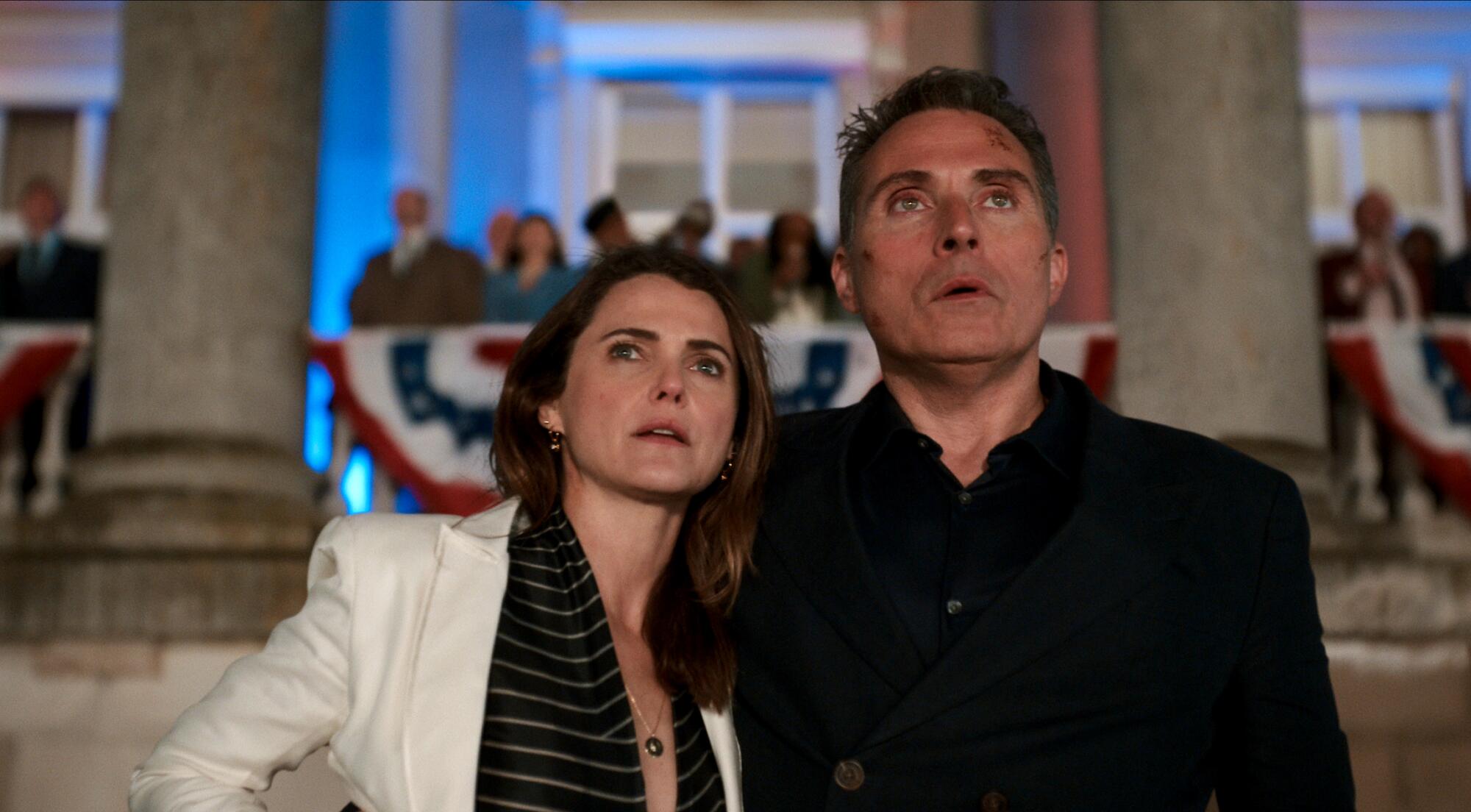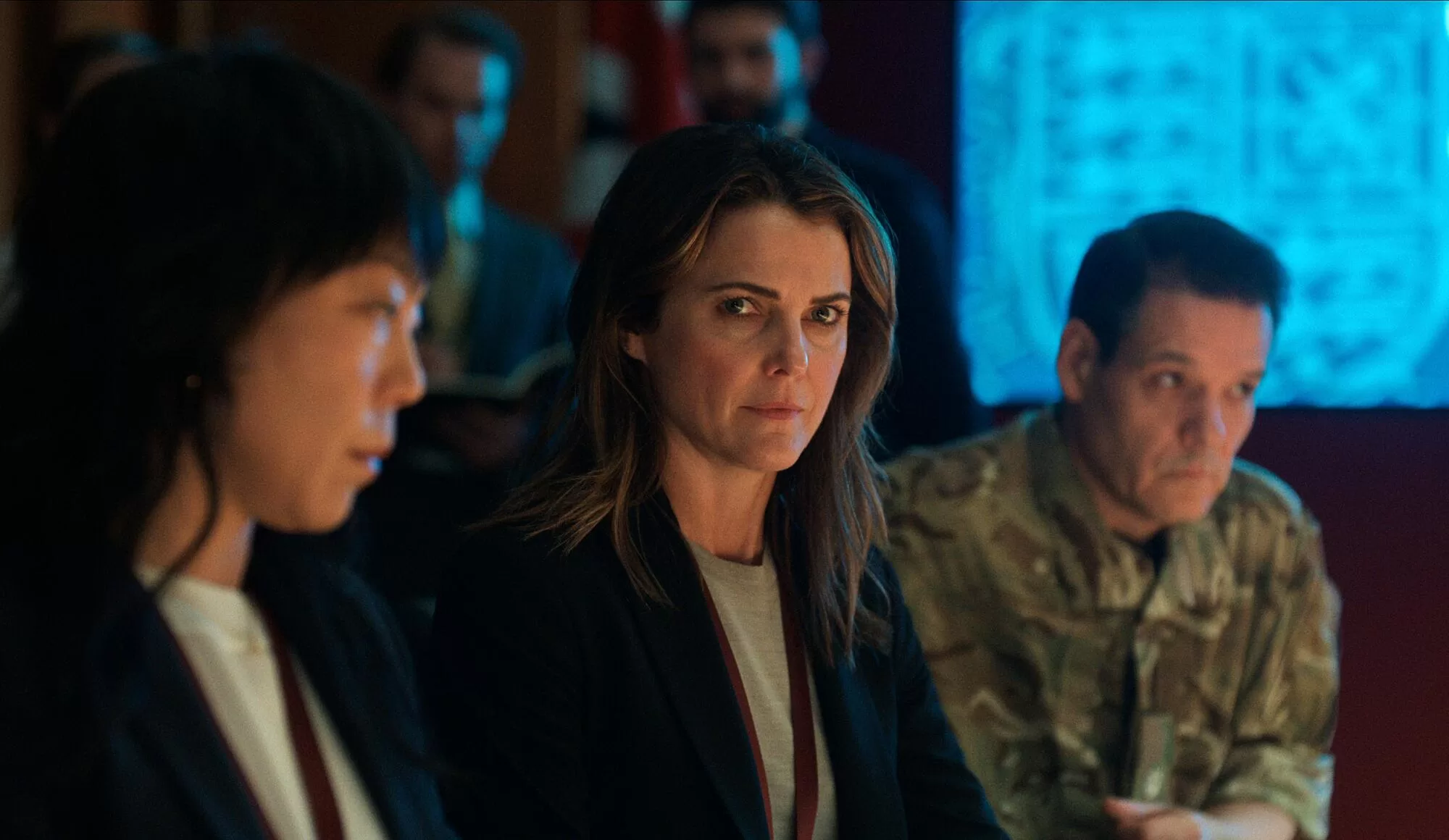This article contains spoilers for the Season 2 finale of “The Diplomat” on Netflix.
In “The Diplomat,” Keri Russell plays a career diplomat covertly being primed to assume the role of vice president — without having to win over an electorate. In real life, one week before election day, Russell has just returned to her home in Brooklyn after casting her vote for Vice President Kamala Harris to be elected the next U.S. president.
“It feels emotional,” she says over a video call, her “I Voted” sticker visible on the upper right side of her cream-colored sweatshirt. “It’s so cool to be standing with everyone in your community, all different ages and all different backgrounds. And to get the chance to possibly elect the first female Black president is f— awesome.”
Time will tell if that comes to fruition. But on “The Diplomat,” a female vice president has indeed become president.
The first season introduced Russell’s Kate Wyler as a seasoned foreign service officer who has her sights set on taking a post in Afghanistan but is reluctantly enlisted by the White House to be the U.S. ambassador to the United Kingdom in order to quietly prep her to become vice president.
The new season, now streaming, has Kate facing the woman she’s been tapped to push out, Vice President Grace Penn, played by Allison Janney. Just as Kate had warmed to the idea of assuming the position — after learning of the VP’s questionable deal makings on foreign affairs — the plan becomes moot in the closing minutes of the season when the president dies. To make things more complicated, the president died while being briefed on the VP’s practices by Hal Wyler (Rufus Sewell), Kate’s husband and a respected veteran diplomat.
Russell spoke with The Times about what the finale sets up for Season 3, currently in production, the silly handoff Janney gave Russell before a scene and what it was like to work on the upcoming season in the run-up to the election.

Keri Russell as Kate Wyler, center, in a scene from Season 2 of “The Diplomat.”
(Netflix)
Let’s begin with that ending — Grace Penn is president. It seemed, at various points, that things could have happened differently. When did you know Grace would end up at the top and what was your reaction?
I didn’t know about that mic drop until I read it, which was probably a month before we started filming [the episode]. The way Debora [Cahn], our writer, and production did it was everyone got to read the very last episode, but everyone, with the exception of myself and maybe Rufus, had that last page redacted so they didn’t know. It was only at the read-through that everyone learned Grace Penn was president of the United States. It’s the right version of juicy fun.
You have those seconds to go, “Oh my God, he’s dead [the president], and that lady is president.” It shifts everything. I love what Debora’s exploring in the writing because Kate has all these opinions of this vice president and bad things she might have done or been involved in. But the truth is, once someone is elected, your job is to support them, and your job is to do your job as well as you can, to represent your country and keep your country as safe and respectable as you can. That is what so many of these people in the State Department, in the Foreign Service, did all those Trump years. In fact, they worked harder those years because they knew they had to keep everything afloat. And so it’s funny, this thing happens [on the show], and it just knocks everything into place in a different way. Alliances shift.
Like the character she plays, Allison Janney is a formidable woman. She appears in the final two episodes of the season and you share a number of incredible scenes where she, as Grace, skillfully puts your character in place. How is Allison as a scene partner?
We are constantly making jokes with each other. We were shooting something for Season 3, and we had been doing rounds and rounds of stuff related to the aftermath of the finale, it’s craziness, arguing all these points and making sure things are happening. Everything’s happening really fast and lots of people are in the room — it’s exhausting. Right before they start rolling, she just comes up to me and put something in my hand as we’re about to walk out [for the scene] and it’s this balled-up, sweaty pantyhose, sock thing that she was wearing. She just gave it me, like, “Here.” Then the director yells “Action!” That’s who she is. She’s fun. It’s impossible not to love her.
How do you see Kate at the end? Is she someone in a weakened position or somebody poised for power?
That’s interesting. She has a couple things going on. I think Kate is really good in crisis. Kate isn’t necessarily good on stage, but I think Kate is a really good helper. She knows how to rally the troops and get everyone in line and make it happen and set up the right meetings. In a way, that bodes well for her. This situation puts her back into work mode, support mode. She also has to deal with what her husband has done. What a f— up. It’s a good thing he’s cute because he is just a problem starter. He is involved in this now in a crazy, integral way, so they’re gonna have to clean up that mess.
The writing of the second season took place before the dual Hollywood strikes in 2023, but there’s overlap with what’s currently going, whether it’s the pressure of a person in office to step down for the good of the country, the possibility of a female president, the resurgence of Russia.
I was worried when politically, everything started happening. I thought, “Oh no, everyone’s gonna think we copied life.” Especially when the Kamala stuff started happening [and she became the Democratic nominee]. I texted Debora and I said, “Are you a psychic witch? What is happening?” I hope people know that Debora wrote this so long ago.

In Season 2, Kate Wyler (Keri Russell), left, had warmed to the idea of becoming vice president, only for Grace Penn (Allison Janney) to ultimately assume the role.
(Netflix)
Kate may be good in crisis, but she’s also made some bad calls in trying to manage the situation unfolding; she doesn’t know who to trust or is sometimes too trusting of the wrong people and the severe consequences that can come from that are taking a toll on her. What intrigued you about how she’s wrestling with the morality aspect of the job and to get certain results, sometimes it requires crossing a line?
It’s really easy to sit back and judge the people who made the choices, but someone has to be in charge and make the choices; they’re going to be wrong sometimes. I make bad decisions all the time as a mom. I do the best I can, but when you’re in charge of people, and you’re at this level, you’re going to make mistakes, and sometimes it involves people’s lives and it’s devastating. The swings are just bigger for people who work in these fields, doing really important world-changing jobs. I think the power question and issue, it is interesting. I do think it is attractive to everyone, ultimately. You can say you don’t want it, but it’s attractive. It feels good when people say, “You’re great, we want you, we all care what you think.” It does lure her in a tiny bit.
After the finale, it’s unclear what Grace’s ascension means for Kate and the VP role. But how has the series made you think about the duties and significance of that position, which is often misunderstood or overlooked? Have you been thinking about it any differently or become more interested in what exactly is required of a vice president?
Absolutely. I listen to every Ezra Klein interview [and] long-form discussion about what vice presidents do. Way back when we were filming Season 2, there’s a pretty decorative, spicy-worded conversation in a scene at dinner where Hal is using some pretty harsh language about the vice president that was taken from real life. That [was said] about Kamala — check my facts with Debora. It’s a thankless job. It is sort of what you make it. I think Biden was such a great vice president because he had so much knowledge about Senate and foreign affairs, and he could busy himself with very important work. He could make that job work for him, but it’s a hard position. And it’s hard to be a woman — people want you to be so many things. We’re still not there yet.
Kate has been questioning whether she should stay in her marriage to Hal but leans on him to maneuver through the complexity of the position she’s in. In the middle of the foreign affairs drama they’re navigating are some very domestic moments — Kate helping him take off his shoes after they’ve had this huge blowout fight or calming him down from his panic attack. Is he to be trusted or is he willing to put his job or his ambition before her?
Hal loves Kate, maybe even more than Kate loves Hal. He is her biggest fan, truly. He would do anything for her. I don’t think he would ever consider his own ambition before her. But he moves really fast and he doesn’t think it through like that. I don’t think he’s calculated like that at all, but he does make bold choices, and sometimes s— happens, like he calls the president and f— gives him a heart attack. He just doesn’t think it through. I don’t think he would ever think of putting himself before her, but sometimes it looks like that. Kate trusts the heart of who he is, but she also knows he gets in his own way all the time.

Keri Russell on the relationship between Kate and Hal (Rufus Sewell): “He is her biggest fan, truly. He would do anything for her. I don’t think he would ever consider his own ambition before her. “
(Netflix)
How much of this world do you understand? Do you find yourself paying closer attention to geopolitical news or thinking about it through a different lens?
We’ll be shooting some scene talking about the plot of who blew up the ship or whatever and I’m always going back to Debora, “Wait, who do we think did it again?” The thing that is really interesting to me now reading the news or listening to a government official speak, is reading in between the lines. That is very clear to me now, “Oh, they are saying this very vanilla thing, but that is a signal to this country to knock it off.” Or what they are not saying that is sometimes the stronger message. All of that becomes really interesting in recent weeks. The tightrope that you have to walk, hence the reason we need certain people running our country and not shooting from the hip.
There’s a moment in the finale where someone says democracy is going out of style. It increasingly doesn’t feel so hyperbolic anymore in the real world. How do you tap into that when you’re in the make believe world of “The Diplomat,” shooting the third season, in the run-up to the election?
It’s easy to think about it because it is what’s going on. The State Department, our army of peace and representation throughout the world, they are our representation. Something Debora was talking about last night at our premiere — the Middle East issue will be solved by diplomats in that room. That’s who helps broker those deals. Those are the people in there, on the ground, negotiating with the two sides. What’s going on in Ukraine will be answered and brokered and solved by diplomats. So these people, no matter what our politics are, no matter who wins a certain election, those people are still out there, on the ground, every day. It doesn’t matter who wins or loses, they still have to do their job. They deserve every support we have, every accolade. They are doing such important work in the world. It’s incredible to portray whatever sliver of their lives because what they’re doing is incredible.
